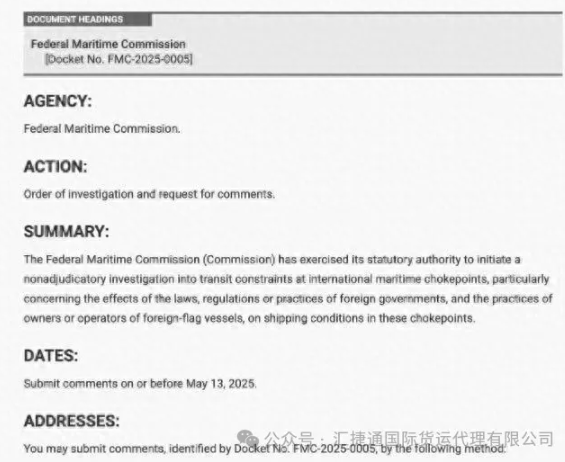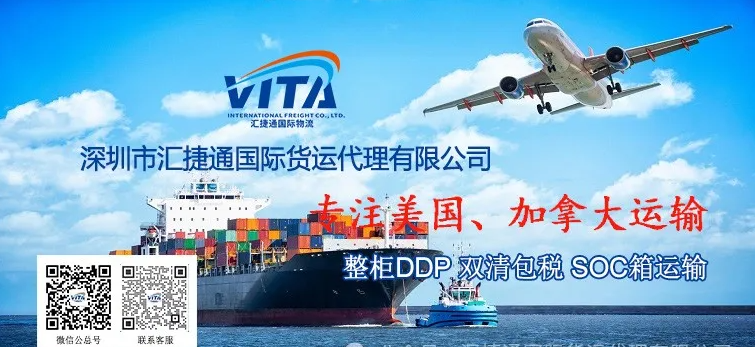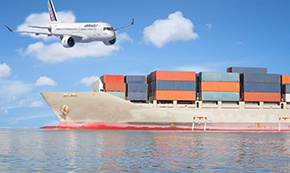All categories >
The FMC's investigation into global maritime chokepoints: What are the intentions?
Categories:
News Center
News
Time of issue:
2025-03-26 18:11
Views:
Recently, news from the maritime industry has drawn widespread attention: the United States Federal Maritime Commission (FMC) has launched an investigation into global maritime chokepoints. What are the purposes and implications of this move? Let's investigate further.

The FMC clearly stated in the Federal Register that it will investigate seven global maritime traffic arteries: the Northern Sea Route, the Panama Canal, the Suez Canal, the Strait of Malacca, the Strait of Singapore, the Strait of Gibraltar, and the English Channel. Furthermore, if it is found that the country of registration of a container ship causes traffic congestion at shipping locations, that ship may be prevented from entering US ports.
Why is the FMC targeting these seven key arteries?
The FMC initiated this investigation in the form of industry consultations, inviting US commercial shipping users to respond to relevant questions. In its view, these seven chokepoints pose a threat to US security and create obstacles to trade. The FMC has listed six specific questions covering the reasons, nature, and impact of restrictions on the arteries, the responsibilities of foreign governments and ship owners, future restrictions, potential FMC mitigation measures, and obstacles.
Taking the English Channel as an example, the FMC points out that its narrow channels and heavy traffic lead to congestion near ports such as Dover and Calais, resulting in a high risk of collisions. Strict environmental regulations, tense geopolitical situations, and security risks can all cause delays and disruptions.
What is the industry's perspective?
Some European maritime industry professionals disagree with the FMC's move, considering it a "waste of time." Wade, a consultant at the Dutch shipping consultancy Dynaliners, expressed confusion over the FMC's list of arteries of concern, noting the omission of important arteries such as the Strait of Bab el Mandeb, the Strait of Hormuz, and the Bosphorus Strait. He also pointed out that the Northern Sea Route has almost zero relevance to US foreign trade, and even if fully developed, its impact would be negligible.
Roger, a veteran in the US West Coast-US East Coast shipping business for many years, said that the FMC was relatively neutral when the US had its own shipping companies many years ago. However, after US shipping companies were acquired by foreign companies and shipping companies raised prices wildly during the pandemic, US exporters were very unhappy. Since then, the FMC has gradually become a tool to crack down on shipping companies. The investigation into the seven chokepoints is vague and broad in concept.
Does the FMC have the authority to enforce the investigation's findings?
Regarding the FMC's investigation, although it explains that its statutory mandate is to monitor and assess conditions affecting US foreign trade and to develop regulations when "conditions detrimental to foreign trade" arise, Wade believes that the choice of "chokepoints" is curious. Trans-Pacific and trans-Atlantic trade, as well as most US domestic trade, does not involve the English Channel and the Strait of Gibraltar, etc.
Even if the investigation finds unfavorable trade conditions, taking action is not within the FMC's scope of action. Some industry insiders said that the problem of maritime congestion points should be raised to the International Maritime Organization (IMO), and the US government has no jurisdiction to change the regulations of other countries and regions. The Global Shippers Forum (GSF) also pointed out that shippers are most affected by congestion points, but the FMC ignored them when requesting information early on.
Roger believes that although the FMC has no enforcement power over other countries, it can use the huge US consumer market as leverage. If it determines that a container ship has affected the US in other areas, it can prevent it from entering the US. This is using the US market as leverage to test other countries and industries. The FMC's investigation into global maritime chokepoints has undoubtedly thrown a "stone" into the maritime industry. We will continue to monitor its subsequent development.

Shenzhen Huijietong International Freight Forwarding Co., Ltd. - Professional US Line Transportation Services
In the US line transportation field, Shenzhen Huijietong International Freight Forwarding Co., Ltd., with its professional services and rich experience, has become the trusted choice for many customers. Huijietong International Freight Forwarding Co., Ltd. focuses on US line transportation and provides comprehensive logistics solutions, including sea freight, air freight, land transport, and warehousing services. The company maintains close cooperation with major shipping companies and can provide flexible space arrangements and efficient transportation services according to customer needs.
Choosing Shenzhen Huijietong International Freight Forwarding Co., Ltd. means choosing professional, efficient, and reliable logistics services. For more details, please visit [Huijietong official website www.szvif.com
For the US, choose Huijietong!
Shenzhen Huijietong International Freight Forwarding Co., Ltd., your professional US line transportation partner.
Service hotline: 0755-82171929 13560787209

WeChat QR Code
Follow us to get the latest updates on global shipping and trade!
Keywords:










